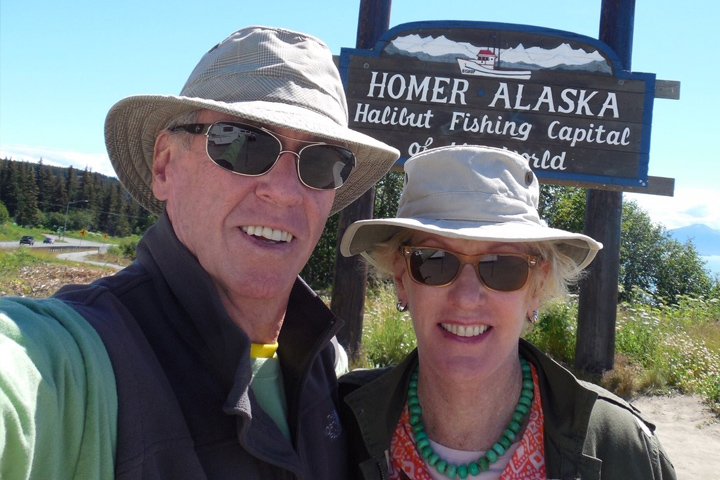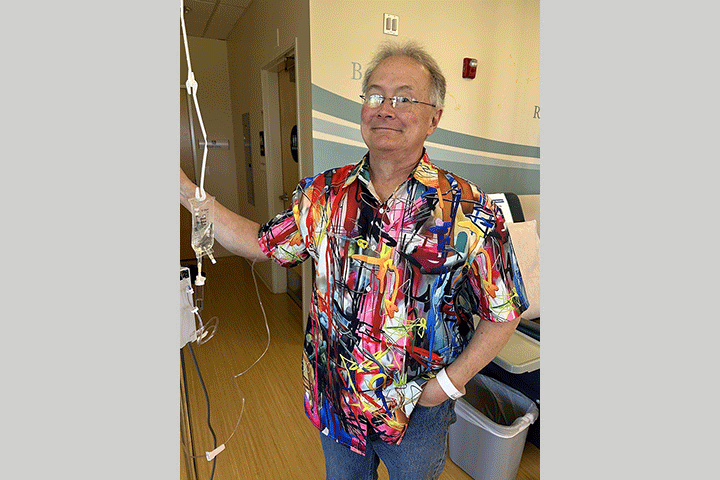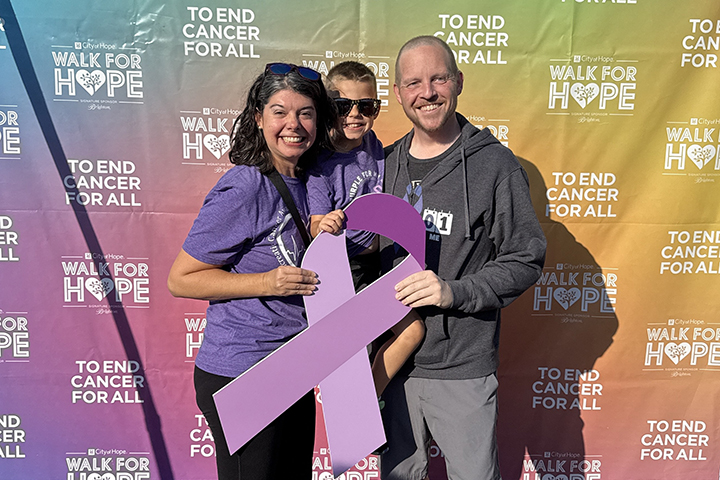Facing My Biggest Danger: Pancreatic Cancer

- Jaundice finally brings a diagnosis
- Taking a chance with a Whipple
- Difficult chemotherapy and radiation
- Joining a clinical trial
- Enjoying life now
Early in the summer of 2009, when I was 58, I began experiencing some unpleasant bodily functioning issues.
I started taking different over-the-counter antacids and reflux medications, which helped but did not resolve the situation. Eventually I made an appointment to see my primary care doctor. At that first medical intervention he suggested I start regular use of Prilosec (which I still take to this day) and I recall that he gave me a routine physical exam that included the basic blood labs. All of my basic systems were working as they should and whatever blood tests he requested came back all normal. My weight was approximately 260 lbs, the same as it had been for the past 25+ years. I am 6’ 2” and have always been a large guy. I should have lost about 25 lbs when I was much younger and more active, but I never did because I felt ok, was hardly ever sick, was active outdoors, and occasionally went to the gym.
Fast forward to two months later, and I had lost approximately 20 lbs. I felt ok but was still experiencing gas and bowel functioning issues with some foods I was consuming, especially fried foods. As a child born and raised in the South, foods like fried chicken, mac and cheese, and cheeseburgers, were staples for my entire life, but now these foods were uncomfortable to consume. My wife convinced me to seek further medical help by going to a gastrointestinal specialist as we were sure I must have some intestinal virus. We never suspected anything like cancer even though my father had been treated for prostate cancer when he was 60 and then passed away at age 80 (in 2001) after fighting esophagus cancer for about two years.
Over the next eight weeks’ time I had two or three office visits with my new “gastro” doctor. These included very specific at-home testing/stool samples for lab work, which failed to find anything abnormal. But my body weight was now down to about 230 lbs. My doctor also suspected I might have had some unnamed intestinal virus but never expressed a belief that cancer could be causing my issues.
Finally, a Diagnosis
In late August 2009, while we were vacationing at our cabin in Blue Ridge, Georgia, I woke up one morning totally yellow from head to toe and I itched like bugs were crawling all over me. We called my doctor with this news and he suggested that we return home immediately as I most likely had a blocked bile duct that was causing the jaundice.
Several days later, with a new stent in place to open up my blocked bile duct, I had an upper GI endoscopy to look into my abdominal area, to see what caused my blockage.
There it was, larger than life, a tumor approximately the size of a quarter attached to the head of my pancreas. My doctor did not have anything good to say about this discovery. He gave us some very grim statistical information while also explaining the few medical intervention options available at that time. This was the first time I was told that the pancreas cancer survival rate was about 5 percent and that most patients died within three to six months with or without medical intervention. My wife and I returned home and spent the next 24 hours learning what a pancreas was and why we should be very concerned.
I spent 33 years as a police officer working in some very harsh environments, seeing more than my share of death and human destruction while never worrying much about my own personal safety—it was part of the job! But the very hardest part of my diagnosis was telling my adult children about my cancer and the hard reality of my pending death.
Everything we read about pancreas cancer revolved around how hard it was to detect or survive. My own experience with detection proved how accurate these statements were. The time from my very first symptoms to my diagnosis was about four months; this fully explained why so many people die from this cancer. In our reading we learned that a great many cancers can be discovered and successfully treated before they become advanced, but not so with pancreas cancer. Most patients die because this cancer is already advanced and metastatic when it’s first discovered. I was apparently “lucky,” since doctors estimated my tumor was at stage II or just starting into stage III. I was also lucky in that my tumor was in the head rather than the tail of my pancreas. We learned that tumor location has much to do with how well and complete a surgical intervention could be done.
Enter the Whipple
Our pathway ahead was very uncertain. Some doctors treated pancreas cancer with upfront chemotherapy and radiation while others used the Whipple procedure for surgical removal. My family wanted me to have my tumor removed before doing anything else. I too agreed—I wanted this cancer out!
The first thing we learned was that the Whipple was a very complex surgery that itself was not always easy to complete. Prior to surgery at St. Vincent’s Medical Center (Jacksonville, Florida), Dr. Kenneth Jones, my surgeon, explained that the first thing he’d do upon getting to my pancreas was to take samples from all of the surrounding organs to determine if my cancer had already spread. He told us that if he discovered cancer in surrounding tissues that he would not proceed to tumor removal as it would do no good. I wouldn’t know what he found until after I awoke from the anesthesia, although he would be able to tell my wife once my surgery was completed.
In Fall 2009 I had a 10-hour Whipple surgery. Later in the recovery area my doctor informed me that he was able to remove my tumor, he could not find evidence that cancer had spread to other areas, and I now had a better chance to beat pancreas cancer. My doctor believed he was able to resect all of the cancer off of my pancreas. I was left with about 50 percent of the organ, which still functioned.
After my Whipple I was in the hospital for five weeks, with multiple visits to the ICU for high fevers, failed drain issues, nonworking bowels, and more weight loss. By the time I left the hospital I weighed 170 lbs! I was released on Thanksgiving Day 2009. No turkey for me that year!
Next Step: Chemotherapy and Radiation
After resting for the next four weeks at home I went to the Mayo Clinic in Jacksonville for chemotherapy. I started my first chemo treatment on December 31, 2009, followed by more treatments, then radiation months later, then another round of chemo. My last chemo treatment was about August 2010. I started with Gemzar but developed a bad rash, so I was switched to FOLFOX. I could write volumes about how badly I felt during the hardest parts of these treatments but I’m not sure I can adequately explain in words how bad I felt. Most people I’ve talked to who also survived their chemo treatments also found it hard to express in words how chemo makes one feel so completely miserable. In my case it made me a non-functioning person. I was miserable; at one point I lay in bed in a fetal position for many days at a time.
Even after these many years as a survivor I have often repeated to my wife and family that if my cancer returned I’d choose not to fight it again if my only option was the chemotherapy I had during this time. I know that there are other options now, and I would consider those.
Joining a Clinical Trial
In 2011, a year or so after my last chemo treatment, I discovered a pancreas cancer vaccine clinical trial at The Sidney Kimmel Cancer Center at Johns Hopkins (Baltimore) for patients who had survived longer than a year, had Whipple surgery, and completed chemo and radiation. There were not many candidates who could check all those boxes so the researchers running the trial were happy when I applied. I was on the trial for the next 18 months. Every 90 days we traveled to Baltimore from our home in the Jacksonville area for a week-long treatment. I’m a big fan of clinical trials but the trial I was on was very costly as well as time-consuming and not covered by most insurance. The test drugs were provided at no charge but everything else was out of pocket. I hope that changes some day!
Good News, Bad News
After my treatment and clinical trial ended, I spent the next few years learning what my cancer survivor’s life was going to be like. I had CT scans about every 90 days. But in 2015 a small mass on my lower right lung, which my doctors had been following since my original diagnosis, grew to about the size of a dime. My oncologist was worried that this was a much-anticipated return of metastatic pancreas cancer.
An outpatient biopsy was scheduled for the next week, but the procedure failed because the mass was blocked by one of my rib bones. Doctors suggested that we should wait a few weeks and try again from a slightly different angle. The second attempt was successful.
This was one of those “good news, bad news” situations. I did not have metastatic pancreas cancer; I had a variety of non-small cell lung cancer! Ever since my cancer journey started, I was asked by every new doctor if I was or ever had been a cigarette smoker. My answer was the same every time: I never smoked cigarettes, cigars, pipes, or anything else. For me it didn’t seem to matter, because I now had a second cancer attacking me within four years.
After consulting with my doctors, we chose robotic surgery to remove my lower right lung lobe at nearby Orange Park Medical Center, which had a newly installed robotic surgical arm. If this surgery was successful, I would not have to go through follow-up chemotherapy or radiation treatments. This was life-altering for me, my family, and friends. The surgery was successful and follow-up CT scans showed that I was once again cancer free.
Marking a Milestone
During my treatment years I was blessed to gain back my strength and was able to return to riding my Harley motorcycle. I made several cross-country trips that were three to six weeks long, with family and friends who rode along. Riding that motorcycle out on open highways always made me feel so much better. Sadly, I decided to stop riding my beloved Harley in 2014, due to advancing foot neuropathy issues.
I had adopted October 24th as my anniversary for beating pancreas cancer, and in 2014 I’d become a five-year survivor, a very big deal! My family and I started early planning for how and where I wanted to celebrate this big milestone. We decided on a trip from Florida to Alaska and back. That five-year celebration trip remains a highlight of my life. I hold the memories of that trip in the same realm as becoming a father.
I’m happy to write that I will be 69 years old in July and am steadily working to complete my eleventh year as a pancreas cancer survivor.
Life is short, be happy, be well.





